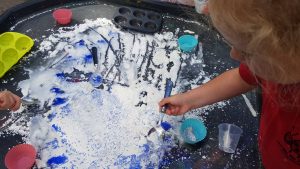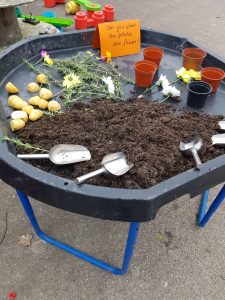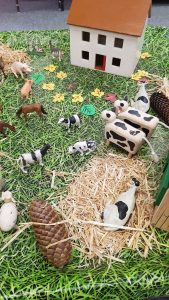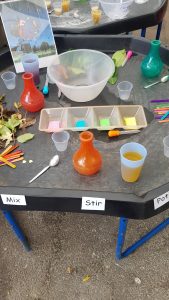Learning through play
Learning and development areas
We work within the Early Years Foundation Stage Curriculum (EYFS) and alongside this we are using Development Matters 2021.
EYFS is a play-based framework which acknowledges that every child is unique, and that they learn and develop, in different ways and at different rates. It consists of three prime areas and four specific areas of learning and development. Below are the requirements of each of these.
The prime areas:
These are crucial for igniting a child’s curiosity and enthusiasm for learning. Building and strengthening their capacity to learn, form relationships and ultimately thrive.
Communication and Language Development: involves giving children opportunities to experience a rich language environment; to develop their confidence and skills in expressing themselves; and to speak and listen in a range of situations.
Physical Development: involves providing opportunities for young children to be active and interactive; and to develop their co-ordination, control and movement. Children must also be helped to understand the importance of physical activity, and to make healthy choices in relation to food.
Personal, Social and Emotional Development: involves helping children to develop a positive sense of themselves, and others; to form positive relationships and develop respect for others; to develop social skills and learn how to manage their feelings; to understand appropriate behaviour in groups; and to have confidence in their own abilities.
The specific areas:
Literacy Development: involves encouraging children to link sounds and letters and to begin to read and write. Children must be given access to a wide range of reading materials (books, poems, and other written materials) to ignite their interest.
Mathematics: involves providing children with opportunities to develop and improve their skills in counting, understanding and using numbers, calculating simple addition and subtraction problems; and to describe shapes, spaces and measures.
Understanding the World: involves guiding children to make sense of their physical world and their community through opportunities to explore, observe and find out about people, places, technology and the environment.
Expressive Arts & Design: involves enabling children to explore and play with a wide range of media and materials, as well as providing opportunities and encouragement for sharing their thoughts, ideas and feelings through a variety of activities in art, music, movement, dance, role-play and design and technology.
A copy of ‘A Parent Guide – foundation year’ is available to look at on the parent’s display. You can also download a copy from www.4children.org.uk.
Parental Involvement
The preschool encourages parents to be fully involved with their child’s development.
“Parents are children’s first and most enduring educators, when parents and practitioners work together in early years settings, the results have a positive impact on the child’s development and learning.” ¹
Parents are able to speak to their child’s key person at any time. We also have a parents evening twice a year, which is an opportunity for parents to get a focused update on their child’s development.
We encourage parents to engage with their child’s Learning Journal, this is a record of a child’s development during their time at preschool. We use an online Learning Journal called EY Log. The EY Log Parent app allows parents to view and comment on observations in addition to recording their own.
We also ask that parents to let your child’s keyworker know of any changes interest so that we can ensure we understand what they like and adapt activities to their interests. Parent helpers are welcome to help at the preschool, just speak to a member of staff.
¹ The Early Year Foundation Stage: Setting the Standards for Learning, Development and Care for children from birth to five – May 2008




